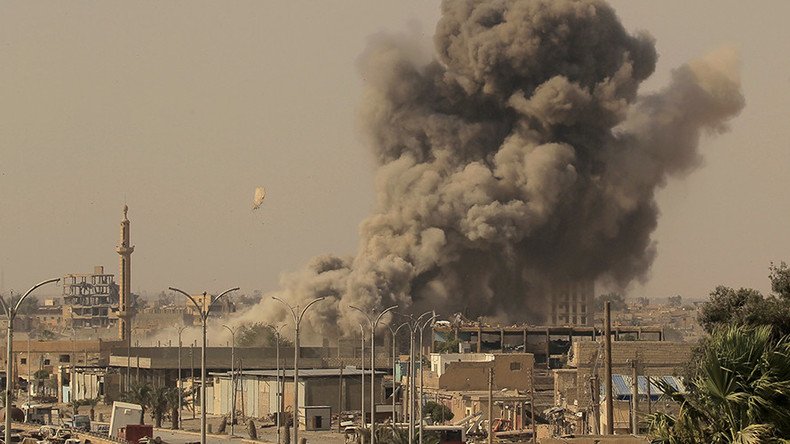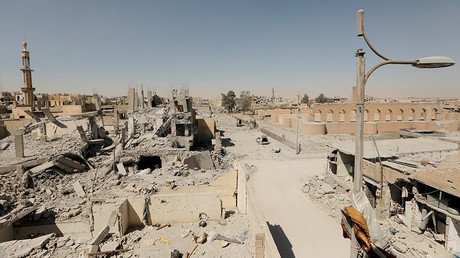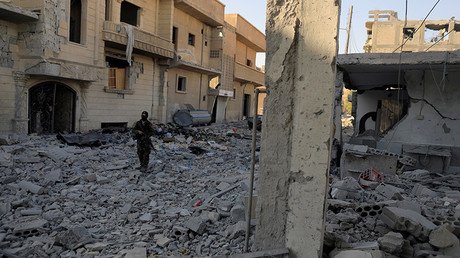‘Worst place on earth’: UN urges US-led coalition to pause airstrikes to spare Raqqa civilians

The situation in Raqqa, Syria is getting worse, with basic services “at all-time low” and thousands of civilians unable to get out of the besieged terrorist stronghold, the UN says, urging the US-led coalition to halt the bombing to allow people to escape.
“On Raqqa, our urging today from the UN side to the members of the Humanitarian Task Force, including the members of the Coalition that is helping retake Raqqa, is that they need to do whatever is possible to make it possible for people to escape Raqqa,” Jan Egeland, Special Advisor to the UN Special Envoy for Syria, said at a press briefing in Geneva on Thursday.
Some 20,000 civilians remain trapped in dire humanitarian conditions in Islamic State (IS, formerly ISIS/ISIL) held areas of the Raqqa city, he claimed.
“The five neighborhoods now held by the Islamic State [IS, formerly ISIS/ISIL], of the city of Raqqa, is an area where the needs are beyond belief and the protection concerns are acute,” Egeland said.
The civilians trapped in the city have virtually no access to basic services, including safe water and food, and are surviving on food they stored up earlier, David Swanson, public information officer from the UN Office for the Coordination of Humanitarian Affairs, told RT.
“The humanitarian situation – up to 25,000 civilians still trapped in Raqqa – is nothing short of dire. Access to safe drinking water, food and other basic services is at an all-time low with many residents relying on food they had stored up earlier to survive,” Swanson said, adding that the only functional hospital in the city remains in IS hands.
In the past few days, multiple media and humanitarian organizations are reporting mounting civilian casualties in the city. On Tuesday, the UN expressed“deep concerns” over the reports, urging all parties “to spare and protect civilians and civilian infrastructure.”
An escape from the besieged terrorist stronghold, however, seems almost impossible due to the intensive fighting, shelling by the mostly Kurdish Syrian Democratic Forces (SDF) and airstrikes by the US-led coalition, Egeland said.
“There is heavy shelling from the surrounding and encircling SDF forces and there are constant air raids from the coalition. So, the civilian causalities are large and there seem to be no real escape for these civilians,” Egeland said, urging the coalition to “think of possibilities, pauses or otherwise that might facilitate the escape of civilians.”
“I cannot think of a worse place on earth now than in these five neighborhoods and for these 20,000 people,” the UN official added.
As a way to ease the people’s plight, Egeland cited the example of the Aleppo liberation, when the Syrian Army and Russia announced humanitarian pauses multiple times to allow civilians the chance to escape the crossfire and provide much-needed aid.
The situation, however, is more complicated in Raqqa, as IS terrorists do not want to communicate with the besieging forces at all, according to Egeland. The lack of such communication, however, cannot be used as an excuse to do nothing to help the trapped civilians, he added. According to the official, “this is time to try anything to allow their safe escape,” however pointing out that many civilians simply refuse to leave due to fear of terrorists, but also from “shelling” and “bombardment” of US-led coalition and forces its backs.
During the operation to liberate Aleppo, the Syrian government in cooperation with the Russian Center for Reconciliation, repeatedly halted the offensive to establish humanitarian corridors and allow tens of thousands of civilians to flee the crossfire.
The latest humanitarian pause was announced days before the city’s liberation to save the civilians of the last remaining districts of the city held by the radical Islamist militant groups, including Al-Nusra Front terrorists. The pause was made as Syria and Russia both prioritized the evacuation of civilians over the advance, according to Russian Foreign Minister Sergey Lavrov.
The most radical elements within the militant groups attempted to jeopardize Russian and Syrian humanitarian efforts on several occasions and used civilians as human shields, also opening fire on fleeing civilians, people who escaped the militant-held parts of the city told RT in December 2016.
The US-led coalition has been urged by international humanitarian organizations on multiple occasions to take all precautions needed during the Raqqa offensive, as some 400,000 civilians remained in the city when the campaign to retake it from IS began. The coalition’s actions resulted in a “staggering loss of human life” and over tens of thousands internally displaced people, the UN said in June.














